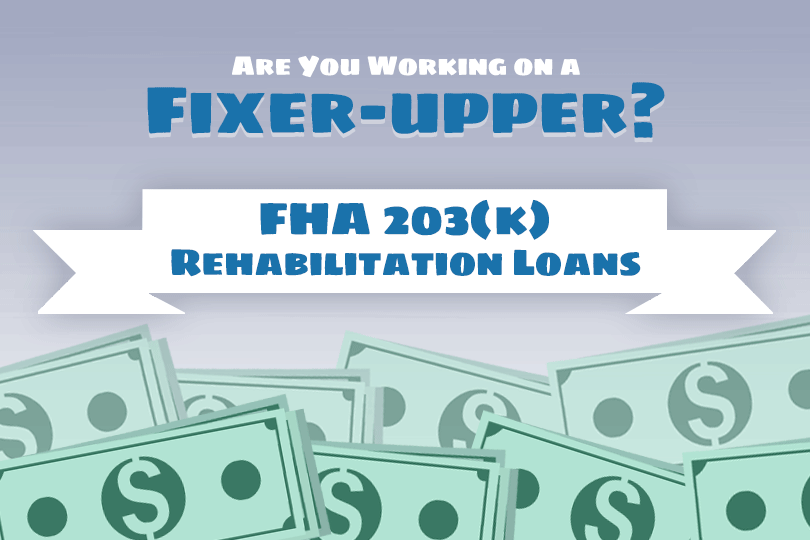FHA Programs for Fixer-Upper Homes
November 8, 2022
The FHA 203(k) Rehabilitation Loan
The fact is that repairs and renovations to your home cost a lot of money. Luckily, the FHA has an option for those with fixer-uppers on their hands. The FHA 203(k) Rehabilitation Mortgages allows borrowers to finance the funds for renovations to a home. This loan program can be used for purchasing a home, and if can also be secured as a refinance if you already have a mortgage on it.
In the case of a home purchase, the loan covers the purchase as well as the rehabilitation of the home, as part of a single mortgage. This loan can be used to finance a property that is at least one year old. Part of the funds go toward paying the seller, and the rest is placed in an escrow account, disbursed as rehabilitation goes on.
Additionally, the refinance option is not exclusively for FHA borrowers. If you need funds for renovation on a home you are currently paying off with a conventional mortgage, you can refinance to the FHA 203(k) Rehabilitation Mortgage.
The FHA Rehabilitation Loan comes with all of the flexible borrower guidelines that the FHA offers on its other mortgage and refinance programs. However, there are a few other factors that come into play. To qualify for an FHA Rehab Loan, the total cost of repairs must amount to at least $5,000. The FHA Loan Limits still apply, so the total value of the property must fall within the lending limits for that area. With Rehabilitation Loans, the property value is determined by whichever is less:
- The home’s value before rehabilitation plus the calculated cost of repairs, or
- 110% of the appraised value of the property after repairs.
There are some remodeling projects that aren’t as extensive as others. You may not need an entire home loan to afford the renovations you have in mind. In that case, there is a “limited” version of the 203(k) Rehab Loan that lets you borrow without committing to the full mortgage. FHA's Limited 203(k) program lets borrowers finance up to $35,000 for renovations.
To qualify for the limited version of the FHA Rehab Loan, the renovations need to meet some requirements. Here are some of the factors that disqualify a borrower:
- The renovation timeline is expected to be six months or more.
- The project requires more than two payments per specialized contractor.
- The required repairs in the appraisal require a consultant to develop a specification of repairs.
- The repairs require plans or architectural exhibits.
You may also be able to combine the FHA 203(k) Rehab Loan with other FHA programs, such as the FHA Energy-Efficient Mortgage option. Ask your lender about these add-ons, and see what the best course of action is for you and your home!
------------------------------
RELATED VIDEOS:
Disclosures Give Transparency to Borrowers
Understanding the Purpose of Your Mortgage Down Payment
Putting Money Into Your Escrow Account

FHA Loan Articles
June 27, 2023The FHA loan process is straightforward and has been successfully navigated by millions of homeowners. If you're considering an FHA loan to finance your home purchase, it pays to be prepared. To avoid mistakes before you start your loan application, homebuyers should keep these tips in mind.
June 20, 2023Can an FHA loan be approved if there are late or missed payments on the credit report? Navigating through financial challenges, such as escalating costs of living and employment uncertainties, can indeed make it difficult to maintain a perfect financial record.
June 15, 2023When you buy a home with an FHA mortgage, cash for closing costs and your down payment is required. It would be easy to assume you simply give the lender cash in the specified amount and that’s the end of the story.
May 20, 2023Did you know there is an FHA loan option that lets you build a house from the ground up? You can use this mortgage to build on land you own or on land you buy as part of the loan. But you will want to address some issues comparing construction loan options.
May 3, 2023Sometimes when buying a home there may be a question of surplus or excess land. You likely won’t face this issue when buying a condo unit, but for other types of purchases, this may be an important factor in the appraisal process.







